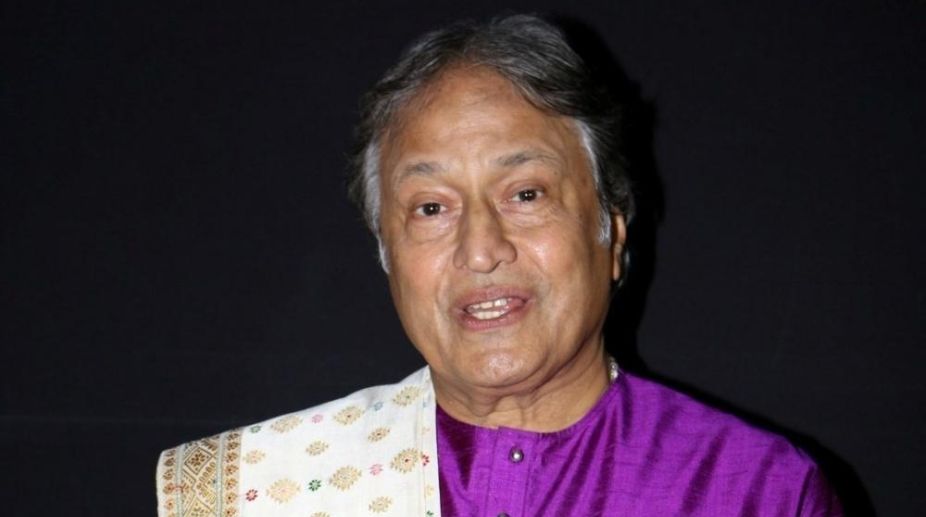Kriti Sanon on nepotism: ‘It’s not just the industry’s fault’
Kriti Sanon addresses nepotism at IFFI, highlighting the role of media, audiences, and talent in shaping Bollywood careers.

Amjad Ali Khan (Photo Credits: IANS)
Veteran sarod player Amjad Ali Khan feels that it’s high time everyone stood up against “disturbing elements that are trying to take away peace from the world” — and artists should show the way.
“Creative freedom needs some space. No world can stay united if you are not together from heart and soul. It’s time for us to stand together against terrorism and other destructive elements that are curbing our growth and making us go back in time,” Amjad Ali Khan said when asked about his take on the backlash faced by some artists from a section of society.
“How can someone disturb the peace, tranquility and why is nobody reacting to it? Education is important, but that is not the only way to bring compassion in a human being. It’s time to raise a hand and fight against destructive elements as we all know that it’s just one section of the world which is committed to destroying it,” he said, adding that “it’s time to fight against arrogance, hatred and destruction.”
Advertisement
Controversy over Sanjay Leela Bhansali’s Padmavati is one example of how the medium of art and films is going through a tough time. Not only films, even comedians in the country, and music artists from across the border, have had to face strident, and sometimes violent, opposition.
However, Amjad Ali Khan says, it was heartening that the world had more peace-loving people than those who would destroy it.
“I hope and pray… let the younger generation experience peace, harmony and tranquility in the world. As a human being I feel proud to see the achievements of mankind. However, I feel that an educational degree is important for any artist today as a back-up plan. Creative fields don’t have formulas or methods (for success),” he said.
“I wish to have music shape the consciousness in a way that contributes to oneness in children; it must be more practical and less theoretical,” added Amjad Ali Khan who was in the capital to receive the 2017 Dayawati Modi Award for Art, Culture and Education for his contribution to Indian classical music.
Amjad Ali Khan is one of the undisputed masters of the music world. Over the course of a distinguished career spanning more than six decades, he has won numerous accolades, including a Grammy nomination, the Crystal Award by the World Economic Forum, Unicef’s National Ambassadorship and the Fukuoka Cultural grand prize. He has performed at venues the world over, including Carnegie Hall and the Royal Albert Hall, as well as at the Nobel Peace Prize Concert in 2014 in Oslo, Norway.
He feels that musical vibrations can convey moods and emotions and have the ability to mould and shape our consciousness.
“Different types of music can have different effects on the mind — both positive and negative. Our mind is like any living organism. It must be nurtured and needs stimulation to develop and grow. Music is one of the most important ‘foods’ for the intellect. Each musical note is connected to this most important part of our minds,” said Amjad Ali Khan.
He said is happy to see the progress of young artists in India. “They are very fortunate to get access to so much content today through YouTube and many other mediums. However, to be a professional, you must learn from a teacher.”
Amjad Ali Khan’s sons, Ayaan and Amaan, are taking forward the legacy and so he is satisfied with the way they have kept the tradition going.
“My years of teaching my sons were quite an experience. It was a first time that I was able to hold a student in my lap. In a family where music is a way of life and is basic to life, the training starts from the moment a child is born,” he said.
“In the course of Amaan’s and Ayaan’s training (which is an ongoing process for a classical musician), I never encouraged them to copy my style of playing beyond a point. As they developed and matured as musicians I was relieved to see both brothers developing a very distinctive and rather different approach to what was taught. This, I feel, is only natural as music is a reflection of an individual’s mind and soul,” the vetaran sarod player said.
So what keeps him busy nowadays?
“Today, I am experimenting, doing interesting projects. The world has indeed become a global village. Musically, there is so much more that has to be done. It’s a long journey. I am looking forward to my collaborations this year with Norwegian Radio Orchestra and Moscow State Philharmonic Orchestra. I hope that we can bring these projects to India too,” he said.
Advertisement